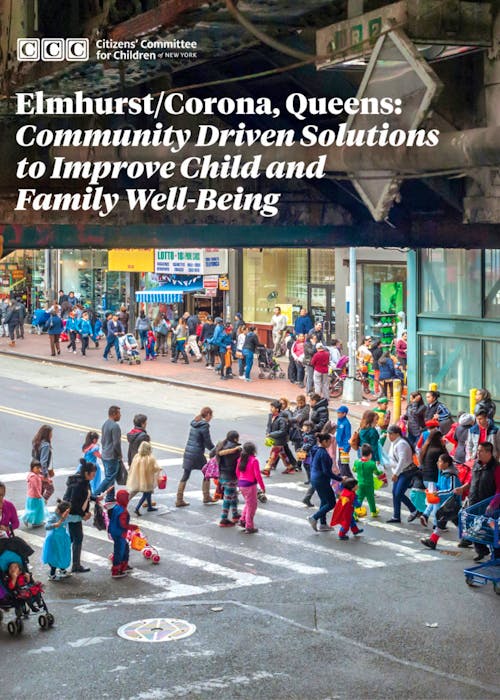

Elmhurst/Corona, Queens: Community Driven Solutions To Improve Child And Family Well-Being.
Data Resources
December 7, 2019
CCC’s new community needs assessment, “Elmhurst/Corona, Queens: Community Driven Solutions to Improve Child and Family Well-being.”
The report paints a portrait of a vibrant, working class community rich in cultural and ethnic diversity. We report findings from our analysis of government administrative data and conversations with community members—parents, youth, and service providers—to illustrate both welcomed and worrisome trends. We also report community-informed recommendations designed to address and ameliorate risk factors and draw attention to the supports and services that community members need.
Elmhurst/Corona is a community of immigrants, with the highest share of foreign-born residents in the city. More than half the population of the district is Latinx and a quarter Asian. Despite working long hours and in many cases multiple jobs, parents face significant challenges making ends meet. These challenges are compounded by a climate of fear attributed to federal policies negatively impacting immigrant communities.
Findings in the report include:
- Just over half of all children in the district live in or near poverty. While rates of employment and labor force participation are high, many residents are in lower-wage industries where incomes may not be enough to support a family.
- More than three quarters of residents are renting, and more than 25 percent of renter households are overcrowded, i.e. housing more than one person per room. Residents cited housing affordability and discrimination by landlords as major stressors on their families.
- While health care trends are generally positive – with high rates of child health care coverage, positive maternal and infant health outcomes and adult life expectancy rates – community members and service providers emphasized the barriers that many adults face in accessing needed health services due to immigration status, concerns around costs, and the fear of sharing personal information. Residents also called for more behavioral health supports and intergenerational supports to address the interconnected stressors young people and their families face.
- Demand for child care vastly outstrips supply, particularly for very young children, and parents experience difficulty navigating the child care enrollment process and finding services to accommodate non-traditional work schedules or participation in workforce development and English classes.
- • While educational outcomes are improving, graduation rates still lag behind the citywide benchmark and the teen birth rate remains higher than the citywide average. Youth expressed real worries about constraints on their economic mobility, educational opportunities and access to extracurricular programs.
- • Environmental conditions pose safety concerns as the community experiences higher incidence of traffic density, disruptive noise and lower street cleanliness ratings. Residents identified parks, playgrounds and public transit as real assets in the community, but also mentioned concerns around public drug use and violence as reasons for heightened insecurity in these public spaces.
More than one third of Elmhurst/Corona households are families with children and while there are many community assets available, our analysis illustrates a clear need to increase access in several areas, especially in the face of long working hours to meet basic economic needs. Among the community-driven recommendations, the report calls for:
- • Increasing investments in affordable housing to address overcrowding and services to protect the rights of tenants in rent-stabilized housing, including preventive services to address housing instability.
- • Providing assistance to parents in applying for child care and early education services, providing programming that is linguistically accessible and addressing key child development needs such as early intervention and behavioral health.
- Providing multigenerational approaches to behavioral health services and peer-to-peer interventions to address youth depression, bullying and substance abuse.
- Creating more afterschool opportunities, including academic supports, arts and cultural opportunities, and expanding access to programs with hours extending later into the evening to accommodate caregivers with non-traditional working hours.
- Investing in adult literacy and other skills-building programs tailored to the unique needs of immigrant communities to increase access to better paying jobs and to promote more quality time for families.
- Organizing efforts to improve public spaces, particularly parks and adding pedestrian safety features such as traffic lights, especially close to schools.
- Working with community-based organizations to ensure a complete and accurate count of residents, especially young children, in the 2020 Census.
We hope these findings and recommendations will be useful to our collective efforts to advance programs, policies and budget solutions, in Elmhurst and Corona and citywide, that make New York a better place for children and families.



